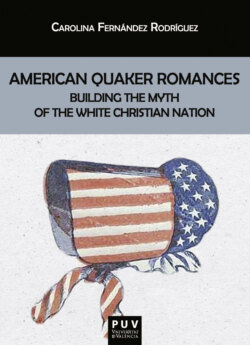American Quaker Romances

Реклама. ООО «ЛитРес», ИНН: 7719571260.
Оглавление
Carolina Fernández Rodríguez. American Quaker Romances
Отрывок из книги
BIBLIOTECA JAVIER COY D’ESTUDIS NORD-AMERICANS
https://puv.uv.es/biblioteca-javier-coy-destudis-nord-americans.html
.....
Comparatively speaking, historical romances featuring Quaker protagonists, which comprise the primary sources selected for this book, constitute a small section of the Christian romance industry, but one that presents readers of inspirational fiction with a paradox that is worth exploring. Despite Darbyshire’s claim (2002) that Christian romances unequivocally promote the message of the Christian Right, this book’s thorough analysis of thirty-nine romances with Quaker protagonists will present a more complex reality. In general, the historical romances under scrutiny seem to offer a vision of U.S. history that stresses the country’s supposed origin as a White and Christian nation where men and women occupied separate spheres, in accordance with the tenets of the Christian Right. However, by featuring Quaker protagonists (typically females, though there are also some male main characters) they capitalize on the reputation of Quakerism, traditionally associated with progressive attitudes and the advancement of social justice, especially the abolition of slavery and women’s suffrage.
Admittedly, as will be seen, heroines of Quaker romances, like those of Christian romances more generally speaking, often devote substantial amounts of time to spiritual considerations, advocate the sanctity of marriage and promote traditional family values, but it is also true that their concern with social justice repeatedly leads them to engage in subversive behavior and to question the status quo in terms of class, gender issues, and, to some extent, race relations. To name but a few examples, these romances feature heroines that are active on the Underground Railroad, dare to challenge the hero on account of his contribution to slavery, demand the right to speak in public meetings or even enjoy a mixed-race romantic affair, if only temporarily. Close reading of these novels complicates an all too easy conclusion that Christian romances simply endorse the Christian Right agenda: they are a product of present-day America’s conflicted relationship with its history of abusive race and gender politics, and the result of the country’s tension between resisting and advocating social change. It should nevertheless be noted that gender roles and race relations are often treated differently in these religious romances. Authors tend to embrace many of the issues on the liberal feminist agenda, but their treatment of race relations is more ambiguous and even questionable.
.....